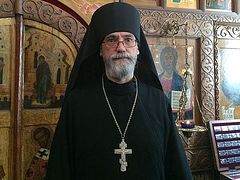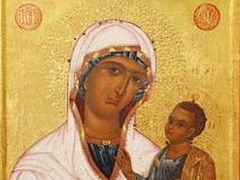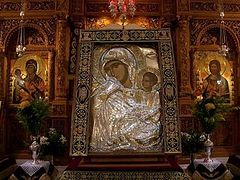 The Church of the Vladimir Icon of the Most Holy Mother of God in Optina
The Church of the Vladimir Icon of the Most Holy Mother of God in Optina
In the name of the Father, the Son, and the Holy Spirit.
Dear brothers and sisters, today we celebrate the third feast in the year of the Vladimir icon of the Mother of God; this one being dedicated to the historical event of her help in driving out of Russia the terrible conqueror Tamerlane.
For what inner spiritual goals do we so often, collectively and liturgically commemorate all of the innumerable cases of miracles of the Most Holy Mother of God? When at the Cross, in the person of St. John the Theologian the Mother of God adopted all mankind—not absolutely everyone, but only those who believe in Christ and honor the Most Holy Theotokos, and of course, who belong to the Holy Church. The Lord spoke these words: Woman, behold thy son, and to His disciple, behold thy mother (Jn. 19:26–27). These were not the words of an ordinary man, but of the God-Man, God Almighty. And their realization, their implementation we know inwardly through experience. We know that the Mother of God is closer to us than our own mothers. And this knowledge comes not from our emotions, but from God’s grace, which God Almighty gave us when he adopted us to the Most Holy Mother of God.
And so, as a child runs to his mother in absolutely all his needs, so do we all run to the Most Holy Mother of God in all our needs. In a moment of danger for the whole country, at everyone’s request, at the collective prayer of all the people, the Mother of God saved our Holy Rus’. And today we also give her thanks, because we now live in our country under the protection of the Mother of God. If it had been conquered then, it would not now be Rus’. And thus do we delight in that same grace that Russian soldiers—and all the people—once received, when they were defended against Tamerlane.
I would like to say a few words about how the Mother of God, as most merciful and philanthropic, influences those upon whom she shows her power. In departing from Russia, Tamerlane was greatly frightened by this vision: A Holy Lady surrounded by radiant angels, each of whom could have alone destroyed the entire invincible Tatar army. Tamerlane then advanced on Constantinople and declared to the Turks who were attacking the city that if they do not cease their attack they will be destroyed. Constantinople was at that time a Christian stronghold, the most important Christian city. And so when the Turks refused to cease their attack, Tamerlane crushed them and then departed from Constantinople. That is how the impression upon a godless man, a man who in human terms was an animal, ultimately influenced him not only to defeat many of his own brothers and drive the enemy away from a Christian city, but also to depart without touching it himself. That is how the Most Holy Mother of God acts even upon those who war against God.
We ourselves run to her at all times, asking her help us in all our needs—when we are sick or when something happens that makes it necessary for us to ask…
But it would be very good if our main requests to her would be concentrated not on the earthly but on the heavenly. We know how the apostle Paul warns us that If in this life only we have hope in Christ, we are of all men most miserable. (1 Cor 15:19). How can we understand the words, “If in this life only we have hope in Christ”? When our consciousness does not extend further than the well-being of our life here on earth. When we do not think about the fact that many sorrows, calamities, and sicknesses are a very necessary treatment, which God as a loving Father uses to heal us, according to the words: For whom the Lord loveth, he chastiseth; and he scourgeth every son whom he receiveth (Heb. 12:6). God sends these very saving sufferings to cleanse away the passions and to save us.
If we unconditionally ask for deliverance from the cross the Lord has placed upon us, we will be “most miserable of all men”. Of course, no one forbids us to turn to our Heavenly Mother in prayers about whatever pains our hearts; but this should not be done unconditionally, but rather in imitation of our Lord Jesus Christ, Who prayed to the Father in the Garden of Gethsemane: O my Father, if it be possible, let this cup pass from me: nevertheless not as I will, but as thou wilt (Mt. 26:39).
This is how we should always pray. And of course, it would be very good if our requests were concerning our spiritual life. That the Most Holy Mother of God participates in our spiritual life we have no doubt. Why do I speak so assuredly? Because ecclesiastical awareness, which has been expressed in a multitude of prayers and canons to the Most Holy Theotokos, is not just an individual human awareness.
We know that the Church is the Body of Christ—mystical, and not just a Body, but united with the Holy Spirit. And that is why the teachings of the holy fathers agree so wondrously with each other in all the fundamental and main things—other than certain entirely individual things, just as people are different, and there are various methods of spiritual struggle. There is no contradiction in this—it is perfectly natural and well-founded. But in the main questions of spiritual life there is perfect unanimity amongst all the holy fathers. Why? Because the Holy Spirit spoke to them in their divinely inspired works—the one Holy Spirit, Who said through Prophet David: My tongue is the pen of a swiftly-writing scribe (Ps. 44:2).
And so, this Holy Spirit spoke also to those writers of divine texts, who composed such beautiful prayers and canons, that the Most Holy Theotokos helps us in spiritual life, in the most important work of our salvation—the struggle with our passions. She helps in spiritual work. We can recall only the morning prayers, where we read, “Direct my steps according to the way of Christ’s commandments”; “Strengthen me to keep awake in song and dispel the dream of despondency”; “Banish from me, thy humble, wretched servant, despondency, forgetfulness, folly, carelessness, and all impure, evil and blasphemous thoughts”, and many other requests of that kind that are contained in these prayers. They express our awareness.
But we must learn to pray properly. Of course, this means not only in prayers to the Mother of God, but in all prayers. There are very many counsels about this in Patristic literature, which for some reason very slowly and poorly reach us believers. Prayer is not a matter of reading the prescribed prayer rule. We must pray so that we would be conscious of what we are asking. That is why St. Theophan the Recluse says, “Do not take any specific rule if you want, but you can simply determine for yourself a time of prayer—perhaps thirty minutes for evening prayers, to each as much as he can. And simply spend that time praying from your whole soul, asking, and penetrating with your awareness into the words of the prayers that we read, so that they would come from the heart.”
Why is this so important? Not at all because God does not know our souls, or the Mother of God does not know them. She knows them perfectly well, and she brings us to reason, instructs us… Even when the great elder Silouan [of Mt. Athos] committed a sin of the flesh, the Most Holy Theotokos came herself and brought him to reason. We should pray attentively in order to become aware that we can’t do it ourselves.
Why do we ask? Because we can’t do it ourselves. And why is it important to recognize this? Because if we receive help, it means that we have already recognized that it is not ours but God’s grace; we have begun to understand not only with our minds but also with our hearts the words of Jesus Christ: Without Me you can do nothing (Jn. 15:5). This awareness allows divine grace to work in us, for God resisteth the proud, and giveth grace to the humble (1 Pet. 5:5). It is precisely for her humility, as in the words of the Most Holy Theotokos, that God looked upon her. So let’s you and I strive to acquire humility of wisdom throughout all our lives.
Prayer is one of the most important ways to acquire humility of wisdom. Not just attention in prayer, but the special awareness of what we intentionally ask—because we cannot do it ourselves. This must always precede the beginning of our prayers.
This is very important! Our whole salvation depends on whether we want to understand who we are, and Who God is! If God is everything, that means that we are nothing! If we want to understand this we will surely be saved. May our Heavenly Intercessor, our Mother, the Most Holy Theotokos, help us in this. Amen.



